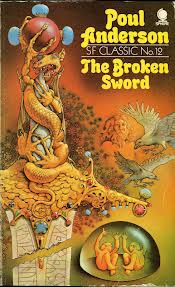In Poul Anderson's The Broken Sword (London, 1977), when Imric the elf-earl visits a witch, she says:
" 'Not often of late lifetimes have the elves gone forth among men...' " (p. 19)
We accept this. Even if it is imagined that elves used to visit humanity, it must be acknowledged that such visits have declined or ceased. Thus, fantasy acknowledges reality. A story in which elven visits remained common would have to be set in an alternative reality - and Anderson wrote those also.
Imric replies:
" 'Aye, we have been too busy in our war with the trolls...But now truce has been made, and I am curious to find what has happened in the last hundred years.' " (p. 19)
Thus an idea that could have filled a book or a series, a hundred year war between elves and trolls, is passed over in a single sentence. Imric speaks:
"...in his voice that was like a wind blowing through trees far away..." (p. 19)
Here is more reality-fiction interaction. If an elven voice is like wind in trees, might wind in trees really be elven voices?
In Norse mythology, Alfheim/Elfland and Midgard/Earth are two of the Worlds among the Nine in the Tree but, by Anderson's account, Alfheim had extensive holdings in Midgard. Imric is the elf-earl of Britain. However, elves with their dwellings and belongings are invisible and apparently even intangible to anyone without witch-sight. Thus, human and elven realms occupy the same space. Imric sees Elfheugh not as a tor but as a castle. A scientific rationale might be different vibrational rates.
"In those days the Faerie folk still dwelt upon earth, but even then a strangeness hung over their holdings, as if these wavered halfway between the mortal world and another..." (p. 21)
They have long since withdrawn to the other.
Although Anderson is better known for sf than for fantasy and although this fantasy was very early, it is as imaginative and readable as any of his works.

No comments:
Post a Comment